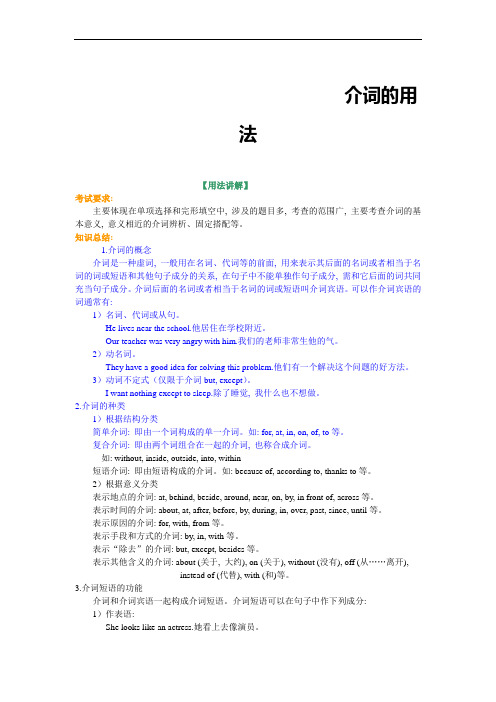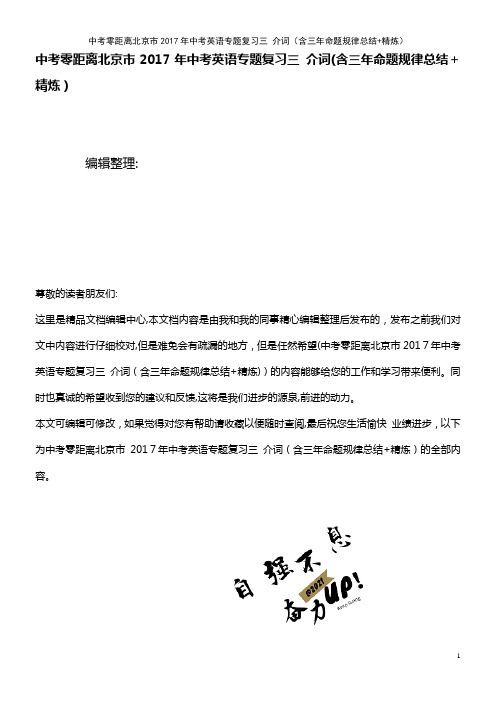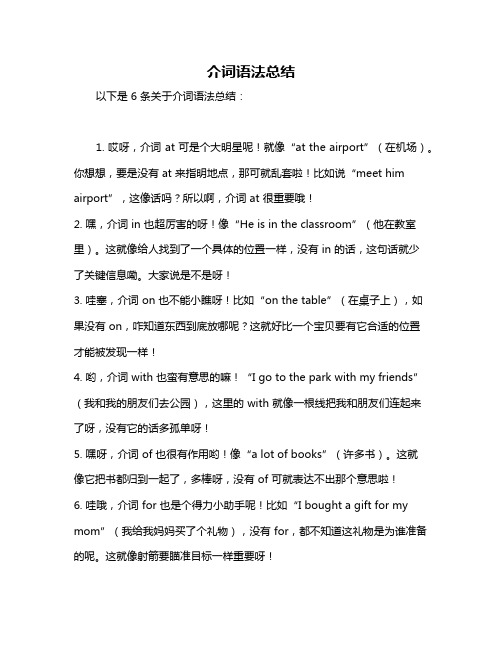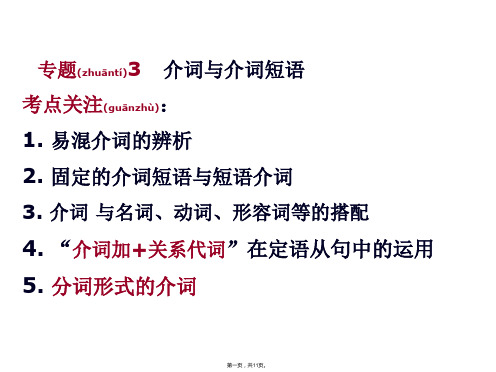语法辅导第三部分 介词范文
初中英语语法——介词的用法

介词的用法【用法讲解】考试要求:主要体现在单项选择和完形填空中, 涉及的题目多, 考查的范围广, 主要考查介词的基本意义, 意义相近的介词辨析、固定搭配等。
知识总结:1.介词的概念介词是一种虚词, 一般用在名词、代词等的前面, 用来表示其后面的名词或者相当于名词的词或短语和其他句子成分的关系, 在句子中不能单独作句子成分, 需和它后面的词共同充当句子成分。
介词后面的名词或者相当于名词的词或短语叫介词宾语。
可以作介词宾语的词通常有:1)名词、代词或从句。
He lives near the school.他居住在学校附近。
Our teacher was very angry with him.我们的老师非常生他的气。
2)动名词。
They have a good idea for solving this problem.他们有一个解决这个问题的好方法。
3)动词不定式(仅限于介词but, except)。
I want nothing except to sleep.除了睡觉, 我什么也不想做。
2.介词的种类1)根据结构分类简单介词: 即由一个词构成的单一介词。
如: for, at, in, on, of, to等。
复合介词: 即由两个词组合在一起的介词, 也称合成介词。
如: without, inside, outside, into, within短语介词: 即由短语构成的介词。
如: because of, according to, thanks to等。
2)根据意义分类表示地点的介词: at, behind, beside, around, near, on, by, in front of, across等。
表示时间的介词: about, at, after, before, by, during, in, over, past, since, until等。
表示原因的介词: for, with, from等。
介词的常见用法与例句分析

介词的常见用法与例句分析介词是英语语法中十分重要的一部分,用来表示各种关系,连接其他词或短语。
在句子中,介词通常位于名词、代词、动词、形容词或副词之前,并指示它们之间的关系。
本文将介绍常见的介词用法,并给出相应的例句分析。
一、表示时间关系的介词1. "at"用于表示具体的时间点:- I will meet you at 7 o'clock.- We're having a party at the weekend.2. "on"用于表示具体的日期或星期:- She was born on January 1st, 1990.- We have a meeting on Monday.3. "in"用于表示较长的时间段:- I will finish this project in a month.- He went to Australia in 2010.二、表示地点关系的介词1. "in"表示大的范围或区域内:- The library is in the city center.- She lives in the United States.2. "on"表示接触或靠在某个表面上:- The book is on the table.- The picture is on the wall.3. "at"表示准确的位置:- I'm waiting for you at the bus stop.- They met at the park.三、表示移动方向的介词1. "to"表示向一个地点或目的地移动:- She walked to the store.- He is going to Paris.2. "from"表示从一个地点离开:- They came from Japan.- He returned from school.3. "through"表示穿过或经由某处:- We walked through the forest.- The road goes through the mountains.四、表示原因或目的的介词1. "for"表示目的或原因:- We go to school for education.- She bought flowers for her mother.2. "because of"表示因为:- The game was canceled because of the rain. - He was late because of the traffic jam.3. "with"表示伴随:- He went to the party with his friends.- She took a walk with her dog.五、表示方式或手段的介词1. "by"表示通过某种方式或手段:- We can travel by car.- He learned English by watching movies. 2. "with"表示使用某物或与某人合作:- He writes with a pen.- She painted the picture with watercolors.六、表示比较或对比的介词1. "than"表示比较级:- She is taller than her sister.- It's colder today than yesterday.2. "as"表示相同程度或相似性:- He is as tall as his father.- This book is as interesting as the previous one.七、其他常用介词1. "of"表示所属关系或材料:- The top of the mountain is covered with snow.- She made a doll out of clay.2. "at"表示注意或特定情况下:- Look at the beautiful sunset!- He was surprised at the news.3. "to"表示关系或方向:- She is nice to her colleagues.- He gave the book to me.总结:通过以上介词的常见用法与例句分析,我们可以看到介词在句子中承担着重要的作用,帮助我们准确表达时间、地点、移动方向、目的、方式、比较等关系。
中考英语专题复习三 介词(含三年命题规律总结+精炼)(2021学年)

中考零距离北京市2017年中考英语专题复习三介词(含三年命题规律总结+精炼)编辑整理:尊敬的读者朋友们:这里是精品文档编辑中心,本文档内容是由我和我的同事精心编辑整理后发布的,发布之前我们对文中内容进行仔细校对,但是难免会有疏漏的地方,但是任然希望(中考零距离北京市2017年中考英语专题复习三介词(含三年命题规律总结+精炼))的内容能够给您的工作和学习带来便利。
同时也真诚的希望收到您的建议和反馈,这将是我们进步的源泉,前进的动力。
本文可编辑可修改,如果觉得对您有帮助请收藏以便随时查阅,最后祝您生活愉快业绩进步,以下为中考零距离北京市2017年中考英语专题复习三介词(含三年命题规律总结+精炼)的全部内容。
介词介词是一种虚词,用来连接名词、代词或相当于名词的其他词语,不能单独使用。
在北京市历届中考语法试题中占有一定的比例。
在一套试卷的10个单项选择题中,至少有1个题是直接测试介词的,在完形填空中至少有1个题是对方位介词、时间介词或介词短语的测试。
介词可与名词、代词或相当于名词的其他词一起构成介词短语来表达不同的含义.介词还可以与动词等其他词类连用构成固定搭配,例如:lookat 看,look after照看,look for寻找, looklike 看起来像。
由此可见,同一个动词look搭配上不同的介词所表达的意义完全不同。
1。
掌握常用介词表示时间、地点、方式等的基本用法.例如:in,on,at, to,fr om,by,of,with, for, about。
2。
区分不同介词的功能和意义,在上下文语境中掌握其用法。
1.抓关键词,判断句意表达的是时间、地点还是其他,然后选择相应的介词搭配。
2。
在上下文语境中判断句子之间的逻辑关系,然后选择相应的介词。
如:(1)表时间的介词a. 表年、季、月、日、时刻:in,on,atb。
表期限:by(在……前;截至),until, till(直到……才)c。
表期间:for(达……之久,经过了多长时间), during(在……期间),through(一直到)d. 表时间起点:from,sincee. 表时间经过:in(多久之后/多久之内),within(在……范围之内)(2)表地点的介词a. 表在某地:at, inb。
介词语法总结

介词语法总结
以下是 6 条关于介词语法总结:
1. 哎呀,介词 at 可是个大明星呢!就像“at the airport”(在机场)。
你想想,要是没有 at 来指明地点,那可就乱套啦!比如说“meet him airport”,这像话吗?所以啊,介词 at 很重要哦!
2. 嘿,介词 in 也超厉害的呀!像“He is in the classroom”(他在教室里)。
这就像给人找到了一个具体的位置一样,没有 in 的话,这句话就少
了关键信息嘞。
大家说是不是呀!
3. 哇塞,介词 on 也不能小瞧呀!比如“on the table”(在桌子上),如
果没有 on,咋知道东西到底放哪呢?这就好比一个宝贝要有它合适的位置
才能被发现一样!
4. 哟,介词 with 也蛮有意思的嘛!“I go to the park with my friends”(我和我的朋友们去公园),这里的 with 就像一根线把我和朋友们连起来
了呀,没有它的话多孤单呀!
5. 嘿呀,介词 of 也很有作用哟!像“a lot of books”(许多书)。
这就
像它把书都归到一起了,多棒呀,没有 of 可就表达不出那个意思啦!
6. 哇哦,介词 for 也是个得力小助手呢!比如“I bought a gift for my mom”(我给我妈妈买了个礼物),没有 for,都不知道这礼物是为谁准备的呢。
这就像射箭要瞄准目标一样重要呀!
总之,介词在英语中可太重要啦,没了它们可不行哟!。
中考英语语法专项复习 介词

中考英语语法专项复习介词介词是一种用来表示词与词,词与句之间的关系的词。
在句中不能单独作句子成分。
介词后面一般有名词代词或相当于名词的其他词类,短语或从句作它的宾语。
介词和它的宾语构成介词词组,在句中作状语,表语,补语或介词宾语。
中考主要考查表示时间的介词、表示方位的介词、表示方式、手段、或工具的介词by,in,on,with 和介词的固定搭配。
对于介词的考察,通常是以单项选择或完形填空形式考查介词用法,尤其是几个易混淆的介词。
另外,介词与动词和形容词构成的固定搭配也是常见的考试内容。
一、表示时间的介词 思维导图记知识点时间介词考点分析知识梳理 表示时间的介词at ,in 与onforbefore 与afterfrombyduring in 表示时间时,用在较长的一段时间on 表示具体某日或某日的上午、下午、晚上后接时间段,表示动作的延续意为“( 时间) 长达……before 表示“在...之前after 与将来时连用表示“....之后表示开始的时间,常与to 构成词组“from...to...表示“到..时候,当( 某时候)到了后接时间段,意为“在..期间二、表示方位的介词 思维导图记知识点介词on 表示一物放在另一物上面, 两者紧贴在一起三、表示方式、手段、或工具的介词by,in,on,with.用by 时,交通工具前不用任何词四.常用介词辨析两个词都有“在...后”之意,behind 只表示位置方面的“在....之后”,不能表示时间,而after则表示时间方面的“在...之后”behind the school 在学校后面after 5 o’clock 5点以后(1)of sb 用于It is +adj+of sb to do sth 句型中,形容词为clever, kind , nice 等描述人物性格特征的词,of 后的人物与形容词有主表关系。
It is very kind of you to help the old man .你帮助那位老人真是太好了。
高中英语语法专题3介词与介词短语课件

(2)except表示“除了(chú le)”。其宾语不包括在 内。
(3)except for强调整体中的细节,意思是“只 是”,前后的事物不属于同类。
第四页,共11页。
(4)but常可与except互换,强调(qiáng diào)“不在其 中”,通常与all, every,
election.
D.A. If B. Given C. Giving (DB. )Have
第十页,共11页。
内容(nèiróng)总结
专题3 介词与介词短语。2. 固定的介词短语与短语介词。with通常指“用”具体的或有形的工具、器官 (qìguān)等。in指“用”语言、字体、墨水、体裁、方式、风格、现金、顺序等。(4)but常可与except互换,
A. at
B. on
C. in
D. to( B )
第二页,共11页。
例2: My uncle lives ____ 103 Chaoyang Street in Beijing. His flat is _____ the tenth floor.
A. at; on B. on; at C. in; on D. of; to
everybody, nobody, nothing等不定代词连用。
(5)apart from意为“除……之外”,即可以表示 besides的意思,也可以表示except或except for的 意思。
例1:Some people choose jobs for other reasons _____ money these days. (2007.全国 II.16 )
(A)
高考英语语法填空解题策略汇:专题3语法填空之介词

距离高考还有一段时间,不少有经验的老师都会提醒考生,愈是临近高考, 能否咬紧牙关、学会自我调节,态度是否主动积极,安排是否科学合理,能不 能保持良好的心态、以饱满的情绪迎接挑战,其效果往往大不一样。以下是本 人从事10多年教学经验总结出的超实用新高考英语专题复习讲义希望可以帮助 大家提高答题的正确率,希望对你有所帮助,有志者事竟成!
(2)above一般表示“在……的上方”,只说明物体 间的上下关系,可能垂直,也可能不垂直。
(3)on一般表示“在……上面”,通常指与物体的 表面有接触。
(4)beyond一般指超过界限、范围、限度等。
2.across,through,over,past都可表示“通过” (1)across指在某一空间内从一端到另一端的表面穿 过。
victory(over),struggle(with)
2.形容词与介词的固定搭配 要求用at的形容词:angry,good,bad,surprised,excited,puzzled,
frightened 要求用of的形容词:afraid,sure,certain,full,tired,fond,proud,
hungry 要求用from的形容词:far,different,free,safe,absent,tired 要求用about的形容词:sorry,worried,anxious,careful,sure,
certain
1. -Good morning, Mr. Lee's office. -Good morning. I'd like to make an appointment __fo_r_______next Wednesday afternoon. 2. Bob thought he couldn't go to the party because he had to write a report, but he went_a_f_te_r___all. 3. China's soft power grows_in______line with the increasing appreciation and understanding of China globally. 4. After school she plans to take a year off to model fulltime before going to university to get a dtehgeree __i_n______engineering or architecture.
英语三级语法辅导之常见介词及词组的用法

be angry at恼怒于, be alarmed at对…保持警觉,be astonished at对…吃惊, be bad at不擅长, be clever at对某事很灵巧,be delighted at高兴,be disgusted at厌恶, be disappointed at对…失望,be good at擅长, be impatient at对…不够耐心, be mad at狂热于,be pleased at对…感到高兴, be present at出席, be satisfied at满意,be surprised at吃惊, be shocked at对…非常震惊,be terrified at受到…的恐吓,be quick at对…很机敏。
b)动词(+sth.)+to+sb.
announce to通知某人, describe to向某人描述, explain to向某人解释, express to对某人表达, mention to提及, nod to向某人点头, report to报告, say to告知, shout to对某人大叫, suggest to对某人提建议,speak to与某人交谈, talk to跟某人谈话, whisper to和某人低声耳语。c)动词+sth./sb.+ to +sth./sb.
b)动词+ sth./sb. +from + sth./ sb. /a place
borrow from向…借, choose from选自, excuse from免除, keep from阻止做,prevent from不准做, protect from不受…之害, receive from收到,remove from移动;除去, save from保全;拯救, separate from分离开来,stop from阻止。
- 1、下载文档前请自行甄别文档内容的完整性,平台不提供额外的编辑、内容补充、找答案等附加服务。
- 2、"仅部分预览"的文档,不可在线预览部分如存在完整性等问题,可反馈申请退款(可完整预览的文档不适用该条件!)。
- 3、如文档侵犯您的权益,请联系客服反馈,我们会尽快为您处理(人工客服工作时间:9:00-18:30)。
介词à1.表示“去向”“地点”Nous allons à Beijing.Il travaille à la poste.2.表示“距离”La gare est à 100 mètres d’ici.3.表示“时间”Il se lève à six heures.4.表示“方式”Il va à vélo.Il écrit cette lettre au crayon.5.表示“所属”Ce magnétophone est à moi.6.引导名词补语C’est une machine à écrire.7.形容词补语Il est fidèle à la cause communiste.8.引导间接宾语Il demande des renseignements àla concierge.De1.表示来源:从...自...Je viens de Paris.Il est issu d’une famille ouvrière.2.表示分量或内容Je voudrais une tasse de café.Un kilo de sucre3.表示“程度”Ma montre retarde de deux minutes.La production a augmenté de 5%4.表示“方式”Il m’a fait signe de la tête.Je l’ai vu de mes propres yeux.Je vous remercie votre invitation à dîner.A.parB.grâceC.deD.à5.引导名词补语,表示“的”C’est la moto de Pierre.6.引导形容词补语Ce mur est haut de 3 mètres.7.引导间接宾语Il se souvient de son voyageenChine.8.引导不定式动词Venir d’une famille pauvreSortir de l’écoleSauter de joieSaluer de la mainAvancer d’une heureY aller de son gréAugmenter de 4%Parler d’un sourire介词à和de都可以引导形容词补语,有的词既可以用à,也可以用de,用à引导不定式,必须是直接及物动词;在无人称句中,il做形式主语,用de引导的不定式做实质主语:Il est fidèle à ses principes.Elle est libre de toutes dettes.La situation est difficile à changer.Il est difficile de changer la situation.Ce programme est intéressant à voir.Il est intéressant de voir ce programme.常见的形容词有:facille,difficile,utile,pratique,important,néce ssaire,possible,intéressant,amusant,agréable,simple介词à,de, en在起引导的多个名词前要重复J’écris à mes parents et à mes amis.Il est allé en Espagne et en Italie.Il leur parle de mon voyage et de mon aventure.其他介词一般都不重复:Elle est sortie avec des amis et des collègues.En1.表示“地点”Les étudiants sont en classe.Il y a beaucoup de chômeurs en France.2.表示“时间”Les festivals ont lieu en été.Ils ont retouné à Naples en août.3.表示“状态”La ville est en fête.4.在...方面Notre région est riche en minerais.Il est très fort en mathématiques.5.表示“方式”Il faut écrire cette lettre en français.Je lui ai donné ce livre en cadeau.6.表示“材料”Nous habitons dans une maison en briques. Cette chemise est en nylon.7.表示“颜色”Ces photo sont en couleurs.En noir et blancSans+inf.+pron.+nomElle sort sans fermer la porte.Vous pouvez manger sans moi.C’est un livre sans illustrations.AvecThomas voyage avec sa femme.(和...一起)Je suis d’accord avec vous. (同,与)Avec le progrès de la science,on vaincra le cancer. (随着,与....同时)J’accepte votre invitation avec plaisir. (表“方式”)Il faut agir avec prudence.Je voudrais une chambre avec salles de bains et téléphone. (带有、具有)Par1.表示地点:经过,从Nous avons passé par Tianjing2.表示“每”On travaille 8 heures par jour.3. 表示方式或方法:用,以,通过J’ai réservé une chambre par téléphone. La délégation est arrivée par avion spécial.4.引导施动者补语Ce repas a été préparé par mon père.mencer par,finir par以...开始,以...结束Ils ont fini par trouver un appartement. 6.表示时间,天气的状语Nous sommes rentrés par un froid glacial.Avant\devantNe me téléphonez pas avant 9 heures du matin.Après\derrièreAprès trois heures de travail,nous sommes tous très fatigués.表示位置的介词和短语:1.s ur在...上面Il y a deux cartes sur le mur.Elle passe ses vacances la Côte d’Azur.A.àB.dansC.parD.surIl a un chapeau sur la tête.表示内容数量、对比等Il a écrit un livre sur la Chine.Sur mille candidats,50 sont reçus.Vos conseils ont exercéune grand influence sur nous.2.s ous 在...下面Le chat se cache sous la table.La température est descendue sous zéro degré.3.d evant 在...前面,地点Il y a un petit jardin devant la maison.4.d errière在...后面,地点Mettez le balai derrière la porte.5.d ans 在...里面Les étudiants doivent entrer dans la salle de conférence avant 8 heures.6.e ntre在...之间,表示在两人和两物之间(可以是空间,也可是时间)。
Le magasin est entre la banque et le cinéma.Il est assis entre nous deux.7.p armi表示在多个人或物之间,后接复数名词、代词、集体名词Parmi les étudiants se trouve le présidentde l’université.8.en face de 在...对面La poste est situé en face de la gare.9.au milieu de 在...中间Elle roule au milieu de la route.10.au centre de 在...中央Ce monument se trouve au centre de la place.11.en dehors de 在...外面Les supermarchés sont situés en général en dehors des villes.12.à côté de在...旁边Asseyez-vous à côté de moi.13.près de在...附近La consigne(行李寄存)est près du bureau de renseignements.Vers\enversVers表示方向或是时间On se verra vers trois heures de l’après-midi.Envers表示抽象概念C’est le devoir du professeur envers les étudiants.Chez在...家Chez le professeur chez nousChez前面可以加别的介词:Près de chez elleDevant chez le médecinPour1、表示目的地,去向Le train pour Wuhan va entrer en gare. 2、表示时间Il quitte ce pays pour toujours.3、表示目的Il faut manger pour vivre et non pas vivre pour manger.4、表示对象,用途Ce sont des livres pour enfants.5、表示:依...看,对...来说Pour les gens du Sud,le riz est la nourriture principale.6、表示价格Il a acheté ce vélo pour deux cents yuans.7、表示作为,当作J’ai un professeur pour voisin.Contre靠着,挨着Sa maison est contre la nôtre. 反对,反抗Ils sont tous contre moi.Un remède contre la doux.Malgré不管,不顾Il s’est mariémalgréson père.尽管,虽然Sortir malgré la pluie malgré soi不情愿的,勉强的,无意的Nous avons entendu votre conversation malgré nous.我们无意中听到了你们的谈话malgré tout不管怎么样,然而Malgré tout c’est un brave homme.兼有介词和副词的词:Devant,avant,après,derrière,depuisNous finissons les cours à16 heures,et après,nous nous amusons.Il n’a plus de place là-bas,venez vous asseoir devant !习题:1.A force de mentir,il ne se fait plus respecter personne.A.àB.deC.parD.contre2. son travail régulier,il fait des heures supplémentaires.A.OutreB.A l’exceptionC.SaufD.ExceptéOutre包含在主句表达的范围之内3.Les Gautier passent leurs vacances lamerméditerranéenne.A.dansB.surC.autourD.au bord de4.Nous allons le professeur ;est-ce que tu veux venir nous ?A.dans,sansB.chez,avecC.depour D.à,avec5.Que voulez-vous dessert.A.pourmeC.deD.à6.Michel a fermétoutes les portes.A.àcléB. àla cléC.avec cléD.en clé7.Pierre est travailleur.Nous devons prendre exemple lui.A.àB.deC.surD.auprès8.Les cloches se mettent àsonner minuit.A.contreB.versC.enversD.autour9.Elle est la première porter toute son attention sur cette question.A.pourB.enC.àD.parEtre le dernier à faire, être le seul à faire 10.Il est parti en vacances un matin ensoleillé.A.àB.enC.parD.dans11.Ce plat n’est préparéque commande.A.surB.sousC.avecD.par12.Elle le considère son propre frère.A.enB.deC.pourme13.Il s’est mis à pleuvoir le 16 mai.A.depuisB.dèsC.deD.pendant14.J’ai passé mon Bac en 1984,mais j’étudie le français 5 ans seulement.A.depuisB.il y aC.àpartir deD.dansDepuis和dès的区别:a.d epuis仅表示动作和状态的开始时间Il travaille dans cette entreprise depuis 1958.b.dès强调时间早Il travailla dès l’âge de seize ans.Il est debout dès cinq heures du matin.15.Vous devez traverser feu vert.A.enB.leC.à laD.au16.Je ne sais pas encore ce que je ferai ,mais je voudrais bientravailler dans l’industrie électronique.A.aprèsB.il y aC.depuisD.avant1.B2.A3.D4.B5.B6.A7.C8.B9.C 10.C11.A 12.D 13.B 14.A 15.A 16.。
